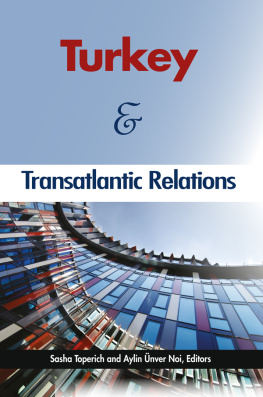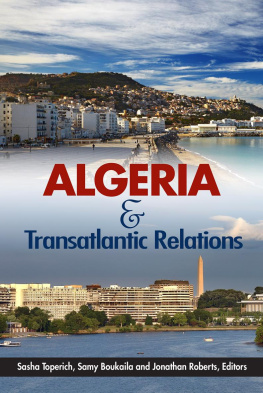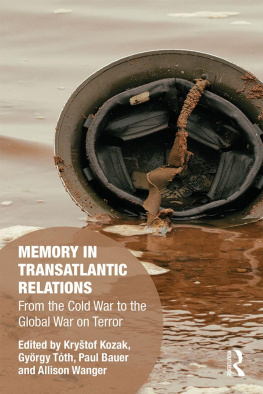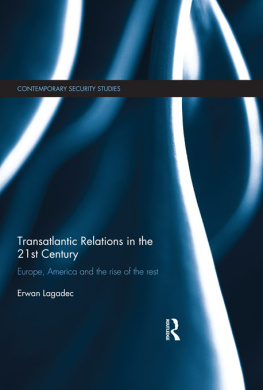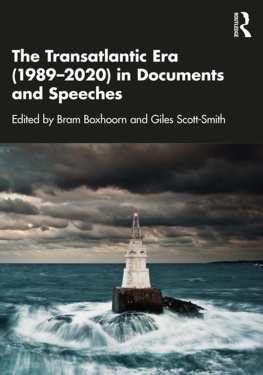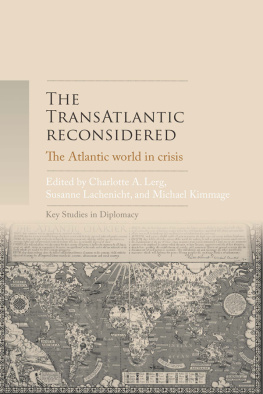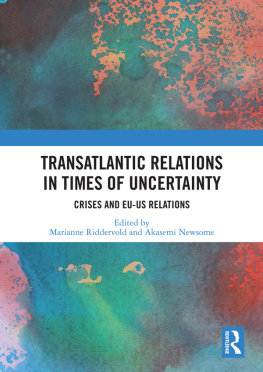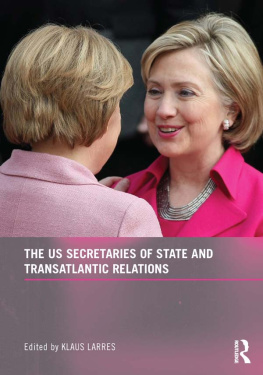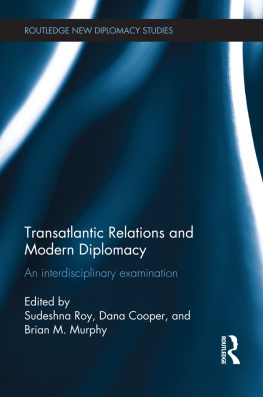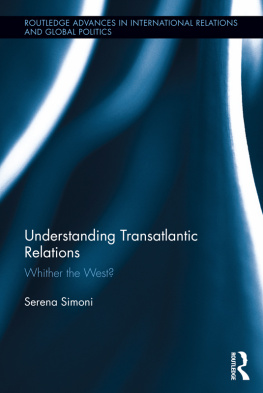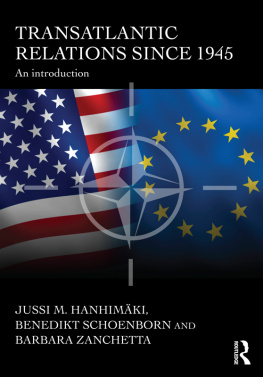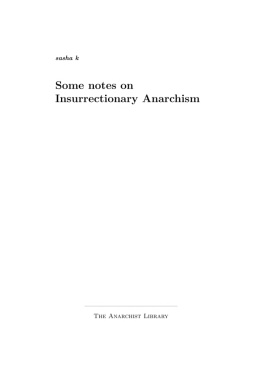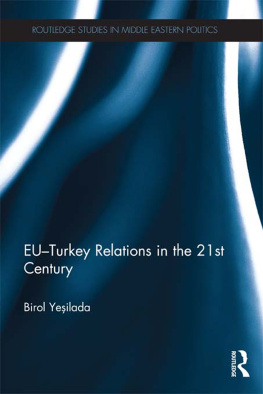Turkey and Transatlantic Relations
Sasha Toperich
Aylin nver Noi
Editors
Center for Transatlantic Relations
The Paul H. Nitze School of Advanced International Studies
Johns Hopkins University
Sasha Toperich and Aylin nver Noi, eds., Turkey and Transatlantic Relations
Washington, DC: Center for Transatlantic Relations, 2017.
Center for Transatlantic Relations, 2017
Center for Transatlantic Relations
The Paul H. Nitze School of Advanced International Studies
The Johns Hopkins University
1717 Massachusetts Ave., NW, 8th Floor
Washington, DC 20036
Tel: (202) 663-5880
Fax: (202) 663-5879
Email:
http://transatlantic.sais-jhu.edu
ISBN: 978-0-9907721-2-5
Cover photograph: Sarka, www.fotolia.com
Contents
Sasha Toperich and Aylin nver Noi
Filiz Ciciolu and kr Ciciolu
Aylin nver Noi
smail alar and Hlya Kevser Akdemir
Yonca zer
Mnevver Cebeci
Kl Bura Kanat
Beril Dedeolu
Enes Bayrakl
Nona Mikhelidze
Eduard Soler i Lecha and Melike Janine Skmen
Mehmet Uur Ekinci
Alida Vrai, Edward P. Joseph, and Tea Ivanovic
Emre Eren
Donald N. Jensen
Altay Atl
Christina Lin
idem Nas
Serdar Altay
Jennifer Miel
Asl irin ner
Erdal Tanas Karagl
Nicol Sartori
Merve Seren and Murat Yerlita
Preface
Turkeys place in the NATO alliance and Western institutions dates back to the years following World War II, when in 1947 U.S. President Harry S. Truman announced that the United States would provide political, military and economic assistance to all democratic nations under threat from external or internal authoritarian forces. Trumans doctrine informed U.S. Marshall Plan support for Turkey and facilitated Turkeys membership in most Western institutions formed over the course of the Cold War, including the OECD, NATO, the Council of Europe and the OSCE. Turkey also developed its relations with the member states of the European Union, building a Custom Union and launching its candidacy for membership.
Today, many foundational elements linking Turkey to its Western allies and partners are being questioned. Dynamics across Turkeys neighborhoodincluding the rise and fall of the co-called Islamic State, waves of migrants, or Russias efforts to project power and influenceare generating new uncertainties and tensions with regard to Turkeys role, its relationships and allegiances.
With these challenges in mind, we asked a number of eminent authors to address a broad set of issues related to Turkey and its role in transatlantic relations, ranging from historical and institutional relations to Turkeys multi-vector foreign policy and its impact on contemporary relations across the North Atlantic. The result is this comprehensive volume. I am particularly pleased that our authors have not limited themselves to description, but are also bold enough to move to prescription. Many propose creative ways to rebuild and strengthen the alliance between Turkey and its transatlantic partners. At this time of fundamental and often disorienting changes, their ideas add value to our debates.
Daniel S. Hamilton
Austrian Marshall Plan Foundation Professor
Executive Director, Center for Transatlantic Relations
School of Advanced International Studies
Johns Hopkins University
Acknowledgements
We would like to express our gratitude to our SAIS colleagues for their valuable support in realization of this project and to the authors for their hard work on this project. We are grateful to them for their contributions.
This publication would not be possible without the support from the SETA Foundation. Our special thanks to Prof. Burhanettin Duran, SETA General Coordinator and Assoc.Prof. Hasan Basri Yaln, SETA Director of Strategic Studies for their support.
We wish to express special thanks to Tea Ivanovic, CTR-SAIS Fellow, for closely working with us to make this project a reality.
Our thanks also to Heidi Obermeyer, CTR-SAIS Fellow and Program Coordinator, and Andy Mullins, CTR SAIS Non-Resident Fellow for their editing work on the publication.
As always, we are grateful to Peggy Irvine and Peter Lindeman for working out the publishing details of this and many other CTR publications.
The opinions expressed in the following chapters are the authors alone, and do not necessarily reflect the views of any government or institution, or those of their fellow contributors.
Dr. Sasha Toperich
Senior Fellow, Center for Transatlantic Relations SAIS
Assoc. Prof. Aylin nver Noi
Non-Resident Senior Fellow,
Center for Transatlantic Relations SAIS
List of Figures and Tables
List of Abbreviations
ACG | AzeriChiragDeepwater Gunashli |
AIIB | Asian Infrastructure and Investment Bank |
AIOC | Azerbaijan International Operating Company |
AK Party | Adalet ve Kalknma Partisi (Justice and Development Party) |
ANAP | Anavatan Partisi (Motherland Party) |
ATC | American-Turkish Council |
A2/AD | Anti-Access/Area Denial |
BCG | Boston Consulting Group |
Bcm | Billion cubic meters |
BIT | Bilateral Investment Treaty |
BLACKSEAFOR | Black Sea Naval Cooperation Task Group |
BRI | The Belt and Road Initiative |
BRICS | Brazil, Russia, India, China and South Africa |
BSEC | Black Sea Economic Cooperation |
BSS | Black Sea Synergy |
BTC | Baku-Tbilisi-Ceyhan |
BTE | Baku-Tbilisi-Erzurum |
BTK | Baku-Tbilisi-Kars |
CAP | Common Agriculture Policy |
CEE | Central and East European |
CENTO | Central Treaty Organization |
CEPR | Centre for Economic Policy Research |
CFE | Treaty on Conventional Armed Forces in Europe |
CICA | Conference on Interaction and Confidence Building Measures in Asia |
CoE | Council of Europe |
CoMENA | Council of Middle East and North Africa |
CPEC | China-Pakistan Economic Corridor |
CPMIEC | China Precision Machinery Import-Export Corporation |
CSCE | Conference on Security and Cooperation in Europe |
CSCP | Caucasus Stability and Cooperation Pact |
DCFTA | Deep and Comprehensive Free Trade Agreement |
DEK | Foreign Economic Relations Board of Turkey |

